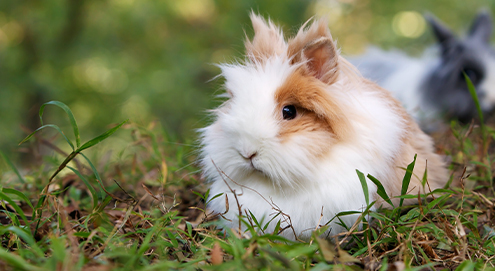How Does a Rabbit’s Digestive System Work?
A rabbit’s digestive system is specially adapted to process high-fiber food like grass and hay as efficiently as possible. Rabbits are herbivores and have a unique intestinal system that functions differently from that of many other animals. Digestion begins in the mouth, where they quickly grind their food with their teeth. The food is then swallowed into the stomach, where it is mixed with digestive juices. From the stomach, it moves into the small intestine, where important nutrients are absorbed.
What makes rabbits unique is how they process fiber. Most of their food eventually ends up in the large intestine and the cecum, a large fermentation chamber where bacteria help break down the fiber. This produces nutrients the rabbit would otherwise not be able to use. Some of these valuable substances are excreted as soft droppings, also known as cecotropes. Rabbits re-ingest these droppings directly, allowing them to digest the nutrients a second time for maximum absorption.
What Can Rabbits Eat?
Because a rabbit’s digestive system must stay in constant motion, it’s essential that they receive the right type of food. Too little fiber or too much sugar can disrupt their digestion and lead to serious health issues. That’s why a proper diet for rabbits mainly consists of hay, supplemented with leafy greens and a small portion of pellets. Understanding how their digestion works helps you make the best nutritional choices to keep your rabbit healthy and content.
The ideal diet for your rabbit consists of:
- 80–90% hay, always available and forming the base of their diet
- 10–15% vegetables and fresh herbs
- 5% pellets
- Up to 5% snacks, fruit, and carrot, as occasional treats only
What Type of Hay Is Best for Rabbits?
There are several types of hay that rabbits can eat, including timothy hay, meadow hay, grass hay, herbal hay, and alfalfa hay. Timothy hay is the most suitable for adult rabbits because it is high in fiber and low in protein. Grass hay is also a good choice for adults, while alfalfa hay is more appropriate for young rabbits or rabbits that need extra energy. Herbal hay contains a mix of grasses and herbs and can be offered as a supplement.
You can alternate between different types of hay depending on your rabbits’ preferences and nutritional needs. It’s important to observe what your rabbits enjoy most and to provide a varied diet that supports their digestion. This may mean switching hay types from time to time to ensure they continue eating enough.
Introducing Vegetables and Fruit
Rabbits need fresh vegetables daily to complete their diet, but not all vegetables are suitable. Vegetables such as endive, chicory, carrot tops, and celery are very good for rabbits. However, avoid vegetables like onion, leek, garlic, and potatoes, as these can be harmful. It’s important to offer variety to ensure a healthy and balanced diet. To help you determine which vegetables are safe, we’ve created a comprehensive list. You’ll find more information in the dropdown menu at the bottom of this page.
Introduce new vegetables slowly so that your rabbit’s digestive system has time to adjust, and to prevent issues like diarrhea. Start offering a variety of vegetables early in life so they get used to a diverse diet. This not only helps keep them healthy but also makes them less picky eaters. Fruits like apple, strawberry, and pear can be given as treats but only in moderation due to their high sugar content.
What Type of Pellets Are Best for Your Rabbits?
When choosing pellets for your rabbit, it’s important to pay attention to the composition, as rabbits require a diet that is high in fiber and low in sugars. Certain pellets are specifically formulated to support rabbit health, especially their digestion. Good-quality pellets contain no artificial colorings or preservatives and are based on natural ingredients like hay and herbs. These pellets are uniform in appearance and do not include muesli or bits of fruit. Good examples of basic nutrition include pellets from Science Selective and Bunny Nature.
Mixed feeds are not recommended because rabbits often pick out only the tastiest parts, such as seeds, and miss out on essential nutrients. Additionally, seeds and grains can lead to obesity and digestive issues.
Supplements for Your Rabbit’s Diet
Dried herbs are a tasty and healthy addition to your rabbit’s diet. They are packed with nutrients, including vitamins and minerals, and add variety. Safe and popular herbs for rabbits include parsley, dandelion leaves, plantain, chamomile, and nettle.
Always introduce new herbs slowly to avoid digestive problems, and observe how your rabbit responds to them. Sprinkle a small amount of dried herbs over their hay or food bowl as a flavorful and nutritious treat. A daily amount of 5 to 10 grams per rabbit is usually sufficient, depending on the size of your rabbit.
If you want to give a snack occasionally, always choose a healthy option, such as Natural Garden Sticks. Make sure your rabbit continues to eat plenty of hay, vegetables, and pellets as the main part of their diet.




